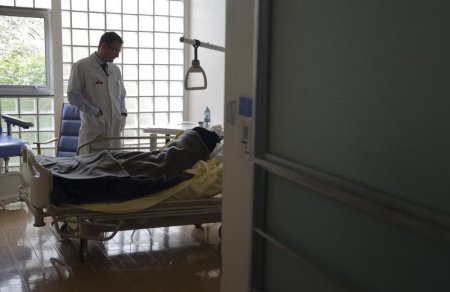The Scary Price of Euthanasia and What it Means For Victims

Back in 2015, I told you about a piece by Washington Post columnist Charles Lane. In it, he described what he called the "sinister" expansion of physician-assisted suicide in places like the Netherlands and Belgium.
Lane wrote that "What's noteworthy about euthanasia in Europe . . . has been its tendency to expand, once the taboo against physician-aided death was breached in favor of more malleable concepts such as 'patient autonomy.'"
One study by leading bioethicists concluded that reports from the Low Countries "seem to validate concerns about where these practices might lead." To that, Lane replied, "That's putting it mildly."
Two years later, Lane has turned his sights, and hopefully those of his readers, on euthanasia once more. The lede in his latest column is the story of a 74-year-old Dutch woman referred to in Dutch records as "2016-85."
The woman, who suffered from dementia, had an "ambiguously worded" advanced directive requesting euthanasia. By the time she was placed in a nursing home, "she was no longer able to clarify her wishes." So her husband requested it for her.
That still left the problem of whether she really wanted it. Well, that was not a problem for the Dutch euthanasia machine. The doctor "concluded her suffering was unbearable and incurable—though there was no terminal physical illness—and prepared a lethal injection."
What followed combined elements of a Monte Python skit and a horror movie. "To ensure the patient's compliance, the doctor gave her coffee spiked with a sedative." When that proved insufficient and the woman recoiled from the looming needle, he "asked family members to hold her down." Finally, "After 15 minutes were spent by the doctor trying to find a vein, the lethal infusion flowed."
In Lane's words, this death was "neither voluntary, painless nor dignified." Even Dutch officials were taken aback: Prosecutors are investigating what happened to see if a crime was committed.
But no one should be shocked. As Lane points out, "Euthanasia is commonplace in the Netherlands, and the legal criteria are utterly subjective." Words like "unbearable suffering" and, in the case of patients like the woman, "a voluntary, well-considered request" can mean anything and, therefore, nothing.
Thus, an NIH study found that "Between 2012 and 2016 . . . there were 33 cases in which Dutch regulators found that doctors had broken at least one rule while ending a person's life." Not surprisingly, "Pro-euthanasia activist doctors were overrepresented in problematic cases."
"Utterly subjective" criteria plus "pro-euthanasia activist doctors" equals a society with a strong bias towards killing, not palliative care or alleviating suffering, as next-door Belgium attests.
There, social workers and nurses who specialize in palliative care, are quitting their jobs. In Belgium, euthanasia has become a "normal way of dying." So much so that these nurses and social workers "functions[ were] reduced to preparing patients and their families for lethal injections."
There's no reason to doubt that the Netherlands isn't headed in the same direction as the case of "2016-85" shows. The "right to die" is morphing into the "duty to die" even if it requires drugged coffee and being held down while the executioner finds a vein.
The headline of Lane's Post article asks "how many botched cases" like the one Lane described, "would it take to end euthanasia for the vulnerable?" The answer is "no amount would be enough." As Lane himself has acknowledged, "once the taboo against physician-aided death" was replaced by this ideal of "autonomy," the rest is nothing but messy details.
Originally posted at BreakPoint.




















